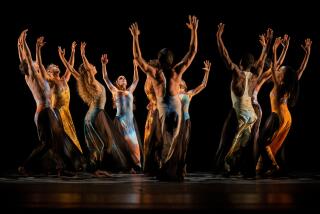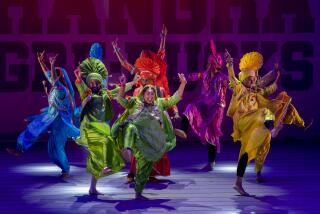Mythic Drama Is Bold, Disarming
- Share via
Just by the way they walk, you can tell the heroes from the villains in Shanta and V.P. Dhananjayans’ danced version of the ancient Hindu epic “Mahabharata,” brought from Madras, India, to the Irvine Barclay Theatre for a single 3 1/2-hour performance Sunday.
The good guys (a.k.a. the Pandavas) walk with a buoyant, footloose lope; the bad guys (alias the Kauravas) stalk and swagger in a heavy-footed, mock-macho manner. And thus, literally, the battle lines are drawn in a mythic dance drama that may use the supremely refined classical Indian idiom Bharata Natyam as its movement base but remains close to folk theater in its approach to storytelling and characterization.
This is a brisk, bold and often disarmingly childlike retelling, definitely not for those who savor the complexities of its source or the way Bharata Natyam can minutely scrutinize every emotional and philosophical ramification of human behavior.
When the hero Arjuna, for example, quails at the prospect of slaughtering his relatives, he’s played here rather like a petulant brat who won’t eat his veggies--and his brother Bhima’s anguish at his own capacity for violence is likewise reduced to little more than a tantrum.
For sheer narrative accessibility, however, it would be hard to beat the way the Dhananjayans and their Bharata Kalanjali company highlight essential actions in the epic through a rich gestural language and a splashy pure-dance vocabulary.
The negotiations between the wily living god Krishna (G. Narendra) and the hunky, obtuse Duryodhana (Suresh Sreedhar) emerge as a varied, intricate mime conversation here--as delightful in its own way as the various divertissements danced by an eight-woman corps.
Although the choice of episodes undercuts Arjuna’s stature, the dancer Rajeshkumar displays great authority and expressive variety, an achievement matched only by M.B. Vijayalakshmi as Draupadi. V.P. Dhananjayan adapts Kathakali style for the fierce Bhima, though the celebrated scene in which he rips open an enemy to bathe in his blood has lost some of its wonderfully horrific Kathakali details.
Preeti Vasudevan supplies both charming English summaries of the upcoming scenes and very helpful previews of their major mime motifs.
Finally, the onstage musicians and vocalists accompany the action with unfailing vivacity and such witty effects as the little drum rolls emphasizing each throw of the dice in a game that seals the fate of the entire world.
More to Read
The biggest entertainment stories
Get our big stories about Hollywood, film, television, music, arts, culture and more right in your inbox as soon as they publish.
You may occasionally receive promotional content from the Los Angeles Times.









